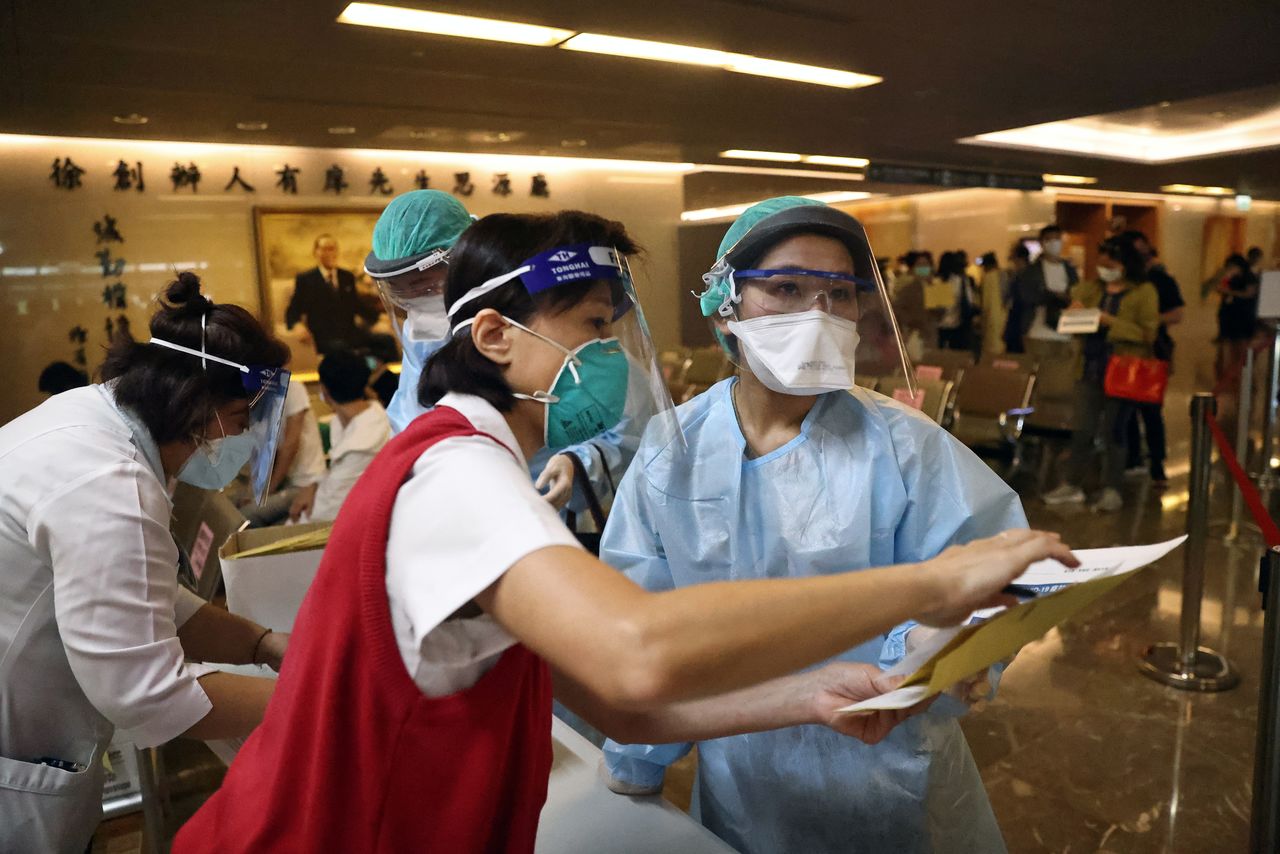What you need to know about the coronavirus right now
Newsfrom Japan
- English
- 日本語
- 简体字
- 繁體字
- Français
- Español
- العربية
- Русский

People wearing protective gear attend a vaccination session for healthcare workers following the recent rise in coronavirus disease (COVID-19) infections, at Far Eastern Memorial Hospital in New Taipei City, Taiwan May 20, 2021. REUTERS/Ann Wang
(Reuters) - Here's what you need to know about the coronavirus right now:
India battles rash of "black fungus" cases
India has ordered tighter surveillance of a rare fungal disease hitting COVID-19 patients, officials said on Thursday, piling pressure on hospitals struggling with the world's highest number of daily infections of the novel coronavirus.
Mucormycosis, or "black fungus" usually infects people whose immune system has been compromised, causing blackening or discolouration over the nose, blurred or double vision, chest pain, breathing difficulties and coughing blood.
Doctors believe that the use of steroids to treat severe COVID-19 could be causing the rash of cases because those drugs reduce immunity and push up sugar levels.
U.S. weighs changes to travel restrictions
The Biden administration has been weighing changes to sweeping travel restrictions that bar much of the world's population from entering the United States, but has reached no decisions, government and industry officials told Reuters.
European Union countries agreed on Wednesday to ease travel restrictions on non-EU visitors ahead of the summer tourist season, a move that could open the bloc's door to all Britons and to vaccinated Americans.
Ambassadors from the 27 EU countries approved a European Commission proposal from May 3 to loosen the criteria to determine "safe" countries and to let in fully vaccinated tourists from elsewhere.
Pfizer vaccine can be stored in refrigerator for a month
The U.S. Food and Drug Administration on Wednesday authorized storage of Pfizer and German partner BioNTech's COVID-19 vaccine at temperatures of 2 to 8 degrees Celsius for up to one month, up from a previous maximum limit of five days.
"This change should make this vaccine more widely available to the American public by facilitating the ability of vaccine providers, such as community doctors' offices, to receive, store and administer the vaccine," said Peter Marks, director of the FDA's Center for Biologics Evaluation and Research.
Australian doctors warn on vaccine hesitancy
Australia's top medical body on Thursday warned the country's residents were "sitting ducks" for COVID-19, as business leaders call for the international border to be reopened faster despite a sluggish national vaccination drive.
The Australian Medical Association said it was worried many Australians were delaying getting vaccinated because of the country's success in stamping out the virus, and urged authorities to roll out a more effective advertising campaign.
Australia closed its international borders in March 2020 to mostly non-citizens and permanent residents, helping keep COVID-19 cases relatively low. It has recorded just under 30,000 cases and 910 deaths.
UK begins 'booster' shot trial
Britain launched a nationwide study on Wednesday to explore whether giving a third dose "booster" shot of coronavirus vaccines would be safe and effective in extending immune protection.
The trial, which aims to recruit nearly 3,000 participants, will look at seven different COVID-19 shots, some of which are already approved by regulators and in wide use and others that are still in development.
British officials have been planning for the possibility of a booster vaccination campaign before the winter after initially targeting immunisation with a two-dose schedule for the whole adult population by the summer.
(Compiled by Linda Noakes; Editing by Kirsten Donovan)
(c) Copyright Thomson Reuters 2021. Click For Restrictions -
https://agency.reuters.com/en/copyright.html
Reuters Japan Health United States Asia Australia East Asia Europe European Union Singapore US